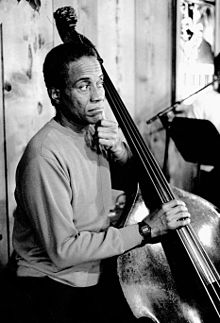Richard Davis (bassist)
Richard Davis | |
|---|---|
 Richard Davis at Bach Dancing & Dynamite Society, Half Moon Bay, California, February 28, 1987 Photo by Brian McMillen | |
| Background information | |
| Born | April 15, 1930 Chicago, Illinois, U.S. |
| Genres | Jazz, classical |
| Occupation(s) | Musician, educator |
| Instrument | Double bass |
| Years active | 1940s–present |
| Labels | Muse, Palmetto |
| Website | www |
Richard Davis (born April 15, 1930) is an American jazz bassist. Among his most famous contributions to the albums of others are Eric Dolphy's Out to Lunch!, Andrew Hill's Point of Departure, and Van Morrison's Astral Weeks, of which critic Greil Marcus wrote (in The Rolling Stone Illustrated History of Rock and Roll), "Richard Davis provided the greatest bass ever heard on a rock album."
Music career
Born in Chicago, Davis began his musical career with his brothers, singing bass in his family's vocal trio.[1] He studied double bass in high school with his music theory teacher and band director, Walter Dyett. He was a member of Chicago Youth Symphony Orchestras (then known as the Youth Orchestra of Greater Chicago) and played in the orchestra's first performance at Chicago's Orchestra Hall on November 14, 1947. After high school, he studied double bass with Rudolf Fahsbender of the Chicago Symphony Orchestra while attending VanderCook College of Music.
After college, Davis performed in dance bands. The connections he made led him to pianist Don Shirley. In 1954 he and Shirley moved to New York City and performed together until 1956, when Davis began playing with the Sauter-Finegan Orchestra.[2] In 1957, he became part of Sarah Vaughan's rhythm section, touring and recording with her until 1960.
During the 1960s, Davis was in demand in a variety of musical circles. He worked with many of the cutting edge small jazz groups of the time, including those led by Eric Dolphy, Jaki Byard, Booker Ervin, Andrew Hill, Elvin Jones, and Cal Tjader. From 1966–1972, he was a member of The Thad Jones/Mel Lewis Orchestra. He has also played with Don Sebesky, Oliver Nelson, Frank Sinatra, Miles Davis, Dexter Gordon, and Ahmad Jamal.[3]
Davis recorded with pop and rock musicians in the 1970s, appearing on Laura Nyro's Smile, Van Morrison's Astral Weeks, and Bruce Springsteen's Born to Run. During his career he performed classical music with conductors Igor Stravinsky, Leonard Bernstein, Pierre Boulez, Leopold Stokowski, and Gunther Schuller.[3]
After living in New York City for 23 years, he moved to Wisconsin in 1977 and became a professor at the University of Wisconsin–Madison, teaching bass, jazz history, and improvisation. His former students include William Parker, David Ephross, and Karl E. H. Seigfried.[4]
Awards and honors
- Best Bassist, Downbeat International Critics Poll (1967–74)
- NEA Jazz Master (2014)[5]
Discography
- Stitt Plays Bird (1963)
- Heavy Sounds [with Elvin Jones] (1967)
- Muses for Richard Davis (1969)
- The Philosophy of the Spiritual (1971)
- Epistrophy & Now's the Time (1972)
- Dealin' (1973)
- Fancy Free (1977)
- Divine Gemini [with Walt Dickerson] (1977)
- Harvest (1979)
- Way Out West (1980)
- Tenderness [with Walt Dickerson] (1985)
- Persia My Dear (1987)
References
- ^ Ron Wynn. "Richard Davis | Biography". AllMusic. Retrieved 2015-09-04.
- ^ Bennet, Bill; Kernfeld, Barry. "Richard Davis". Oxford Music Online.
{{cite web}}:|access-date=requires|url=(help); Missing or empty|url=(help) - ^ a b "Richard Davis". richarddavis.org. Retrieved 9 October 2016.
- ^ "The University of Wisconsin-Madison School of Music | Richard Davis". Music.wisc.edu. 2014-07-14. Retrieved 2015-09-04.
- ^ "NEA Jazz Masters: Richard Davis". National Endowment for the Arts. Retrieved June 27, 2013.
External links
- 1930 births
- Living people
- American double-bassists
- Hard bop double-bassists
- Jazz fusion double-bassists
- Mainstream jazz double-bassists
- Musicians from New York City
- Musicians from Madison, Wisconsin
- Post-bop double-bassists
- University of Wisconsin–Madison faculty
- Muse Records artists
- Impulse! Records artists
- Palmetto Records artists
- Galaxy Records artists
- Cobblestone Records artists
- American jazz double-bassists
- American classical double-bassists
